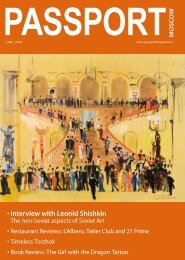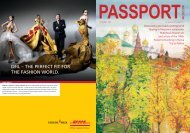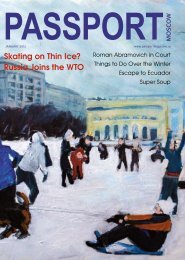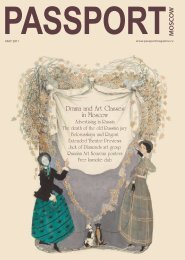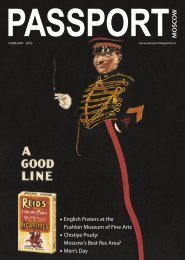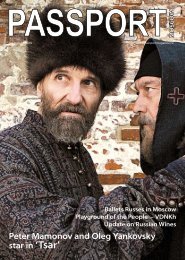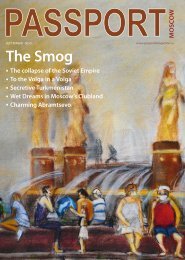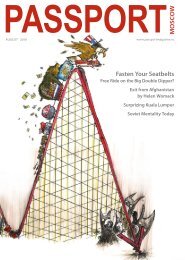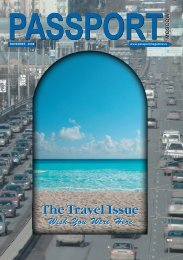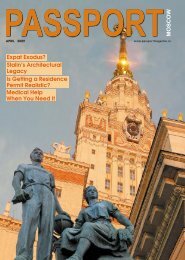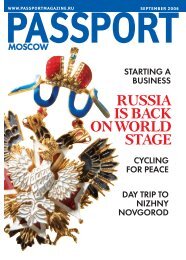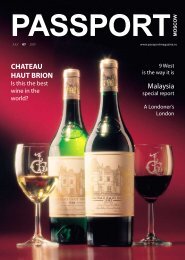A Truly Significant Holiday - Passport magazine
A Truly Significant Holiday - Passport magazine
A Truly Significant Holiday - Passport magazine
Create successful ePaper yourself
Turn your PDF publications into a flip-book with our unique Google optimized e-Paper software.
IWC Reaches Out<br />
text and photo, John Harrison<br />
This year marks the thirty first anniversary<br />
since the first International Women’s’<br />
Club meeting was convened in<br />
Moscow. The IWC’s work in 2008 wound<br />
up with a tremendously successful winter<br />
Bazaar that raised more than the previous<br />
year despite the fact that there were<br />
fewer volunteers available to work the<br />
stalls. The IWC, like the expat community<br />
as a whole in Russia, has shrunk as families<br />
have moved back home for work or<br />
personal reasons. In 1998, membership<br />
stood at 1,800; now it is down to 600,<br />
plus the 150 ambassadors’ wives who<br />
are IWC members by default. Be this as it<br />
may, the club’s work; that of providing a<br />
way for women to come together from<br />
completely different backgrounds and<br />
countries of origin, continues unabated.<br />
Thousands of people have found friends<br />
and inspiration from the club’s work. An<br />
uncountable number of people have<br />
benefited directly and indirectly from<br />
charity work. Instead of winding down,<br />
the club is reaching out to new sections of<br />
the community.<br />
Two current IWC co-presidents, Nubia<br />
Pirone de Meyer, a judge from Uraguai<br />
and Julieta Cervantes, wife of the Mexican<br />
ambassador explained the current<br />
situation:<br />
What are the main activities of the IWC?<br />
Nubia Pirone:<br />
The main events are our winter bazaar<br />
and the yearly Embassy Dinner & Ball,<br />
but our major focus is on charity work.<br />
We have about 70 charities now which<br />
we support, which use the proceeds<br />
from these two events. We work a year in<br />
advance, so the money we make in the<br />
ball this year will be used for charity in<br />
2010. In this way we are sure that all the<br />
projects we are supporting will not be cut<br />
in the middle. This is something the IWC<br />
has been doing in Russia for 22 years, crisis<br />
or no crisis. Charities range from burn units<br />
in hospitals, to orphanages, to cancer<br />
support groups and animal protection<br />
societies.<br />
Apart from our charity work, probably<br />
our most important activities are what we<br />
call the “interest groups.” There is a huge<br />
variety of groups available, from bible<br />
study, to bridge and sport. Then there are<br />
Two of three co-presidents of the IWC:<br />
Nubia Pirone de Meyer a judge from Uruguay. Julieta Cervantes,<br />
wife of the Mexican ambassador. Natalie Volkoff, Co-Chair Charities<br />
the coffee mornings, which are becoming<br />
increasingly popular.<br />
How is the IWC changing in the face<br />
of the crisis and the current situation in<br />
Russia?<br />
Julieta Cervantes:<br />
Originally the IWC was run and geared<br />
towards the wives of diplomats. When<br />
the Soviet-Union collapsed, membership<br />
increased since business with and<br />
within Russia increased. Wives of business<br />
expats became members too. Also<br />
there are more working women with us<br />
today. These people are not available to<br />
attend IWC meetings during the week,<br />
so we have coffee meetings on Saturday<br />
mornings which are becoming very<br />
popular. In some cases it is the women<br />
who are working and the men not. We<br />
would like to form an interest group<br />
for mothers with children, if there are<br />
enough people.<br />
We have even received a few requests<br />
for men to join the IWC. So we are<br />
thinking about whether we should start<br />
some club for men.<br />
Nubia Pirone:<br />
In Moscow it is not easy to find another<br />
group of people who you can really<br />
communicate with when you are an<br />
expat.<br />
Interview<br />
Julieta Cervantes:<br />
For women, it is a great opportunity<br />
to meet people and ask all sorts of<br />
questions. It is a lot easier when you are<br />
in a country where you can speak the<br />
language. When you arrive here, you<br />
need help to simply buy things, let alone<br />
make friends. It is very important to have<br />
an open door and an open mind for all<br />
these people. Everyone, everywhere in<br />
the world is going through an economic<br />
crisis. But people still need to keep going,<br />
to get together, doing things, creating<br />
things, and helping people. In spite<br />
of all these issues, people don’t want to<br />
just sit down at home and watch, they<br />
want to participate.<br />
Nubia Pirone:<br />
We used to have a 5% stop on Russians,<br />
that restriction was lifted about three<br />
years ago. There are a lot of Russians who<br />
left in the beginning of the nineties, who<br />
are coming back. They have learned to<br />
move about in international circles, and<br />
want to continue this back in Russia. This<br />
is all balanced by the fact that diplomatic<br />
traditions in the IWC are still strong. We<br />
have the ambassadors’ wives hosting<br />
coffee mornings and participating in<br />
organizational work. In all, the IWC is<br />
maintaining its core mission, but no<br />
longer only reaching out to just one part<br />
of the expat community. P<br />
March 2009 11



